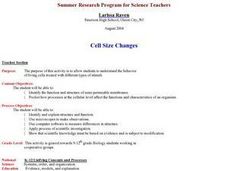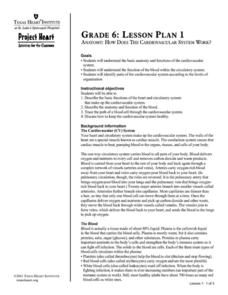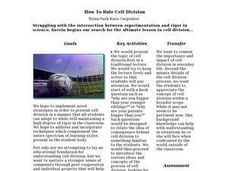PBL Pathways
Cell Phones
Calling all subscribers! Model revenue based on individual cell phone subscribers. The project-based learning activity presents a challenge to scholars from a cell phone company. Individuals model data provided to them from the company...
University of Minnesota
Neurotransmission Model
Don't lose your marbles — you'll need them for a instructional activity on neurotransmission. Young scholars build a neurotransmission model using marbles, beads, rubber bands, string, and other elements. After studying specific...
Curated OER
Teaching About Plate Tectonics and Faulting Using Foam Models
Young scientists learn about plate tectonics and the three different types of faults (normal, reverse, and strike-slip) using foam models. The activity also covers common types of locations where these faults are found.
Virginia Department of Education
Building a DNA Model
It has been decades since the discovery of DNA. Still, activities such building this DNA model allow blossoming scientists to better understand the components that form this overall structure. During this activity, they will also...
Colorado State University
What Is a "Convection Cell"?
Round and round in circles it goes! A hands-on activity has learners recreate a model of a convection cell. They watch as the difference in density of their materials creates a current.
LABScI
DNA Structure: Gumdrop Modeling
DNA molecules hold the secrets that make us unique. The fourth of 12 lessons explores the structure of DNA by building candy models. After building the models, young scientists break their models to begin the process of DNA replication....
Grapevine Colleyville Independent School District
Mitosis Claymation Lab Instructions and Rubric
A single-paged set of instructions and grading system for a mitosis project are laid out for your life science learners. (Note that the page is repeated, making this a two-page document.) Pairs of beginning biologists use clay to model...
Baylor College
Modeling an HIV Particle
Models are an important part of science; they help us see the world on a scale that works for us. In the first of five lessons on HIV, learners make a paper model of the HIV virus that is about 500,000 times larger than the actual virus....
Curated OER
Gumdrop Crystal Models
A great way to learn about molecular structures is to make a model. Gumdrops and toothpicks are used to construct crystal models. The models are based on theories of crystal shapes that occur because of positive and or negatively charged...
Curated OER
Stem Cell Research
Students examine embryonic cell research and the controversy that surrounds it. In this stem cell lesson students use a debate model and present and defend their positions.
Curated OER
Spotlight on Photovoltaics and Fuel Cells
Students conduct Internet research to examine the pros and cons of photovoltaics and fuel cells. They watch a web simulation on fuel cells, complete a handout, and create molecular models using pipe cleaners and gum drops.
Curated OER
Nerve Cell Informercials
Young scholars research the structure and function of the nervous system. They prepare a model or representation of neural transmission. Students create an infomercial about nerve cells.
Curated OER
Daniell Cell
High schoolers explain how Daniell cells work. In this electrochemistry lesson, students conduct a variety of experiments to explore the different types of cells. They create a model of Daniell cell.
Curated OER
How to: Build a Plant Cell
Students build a 3-dimensional model of a plant cell with household objects. In this plant biology lesson, students construct replica plant cells in groups of three. After completing their projects, students share their creations with...
Curated OER
Solar Cells
Students are able to answer basic questions about the process of turning light energy into electrical energy. They are introduced to the basic physics and chemistry behind the operation of a solar cell. Students explore how a single...
Curated OER
Cell Size Changes
Students examine the behavior of living cells treated with different types of stimuli. They watch an online movie, examine wet mount slides under a microscope, take an online quiz, and analyze data.
Curated OER
Using Models to Communicate
In this models worksheet, students read about how models are used to communicate events or principles in science. They are given an example and answer 4 questions about models. They discuss accuracy and inaccuracy of models. They create...
Curated OER
investigating and Modeling Sea Urchin Fertilization and Development
Young scholars begin by using clay to model fertilization and early development of sea urchins and chordates. They move on to mixing live sea urchin sperm and ova together to observe, diagram and record events occurring in fertilization...
Curated OER
DNA Models
Students create DNA models. Using puzzle pieces to represent the parts of a DNA strand, they put together a segment of DNA. Once everyone has completed their individual strand, they being linking with other students using tape. Class...
Nuffield Foundation
Modelling the Human Ventilation System
Why is breathing so difficult for asthma sufferers? To find out, learners build their own lung models in the investigation (from a British website, hence the term ventilation system instead of respiratory system). Using...
Howard Hughes Medical Institute
What van Leeuwenhoek Saw
When van Leeuwenhoek saw cells and single-celled organisms for the first time, he knew these small things were a big deal! Share his discoveries with young learners through a narrated video, model-building activity, and scale study....
K12 Reader
Active and Passive Transport
Active and passive systems used to transport materials to and from cells are the subject of a comprehension activity that asks readers to use information from the article to answer a series of questions based on the text.
Texas Heart Institute
Anatomy: How Does the Cardiovascular System Work?
How can the circulatory system compare to a city map? Pupils distinguish the "roadways" and "vehicles" of the cardiovascular system, compare the anatomy and function of veins and arteries, and review different types of blood cells with...
Curated OER
How To Rule Cell Division
Learners explore cell division through auditory, visual and tactile stations that each describe a stage of cell division. Then they apply the information from the stations in a mini-homework project that is tailored to one of the...























